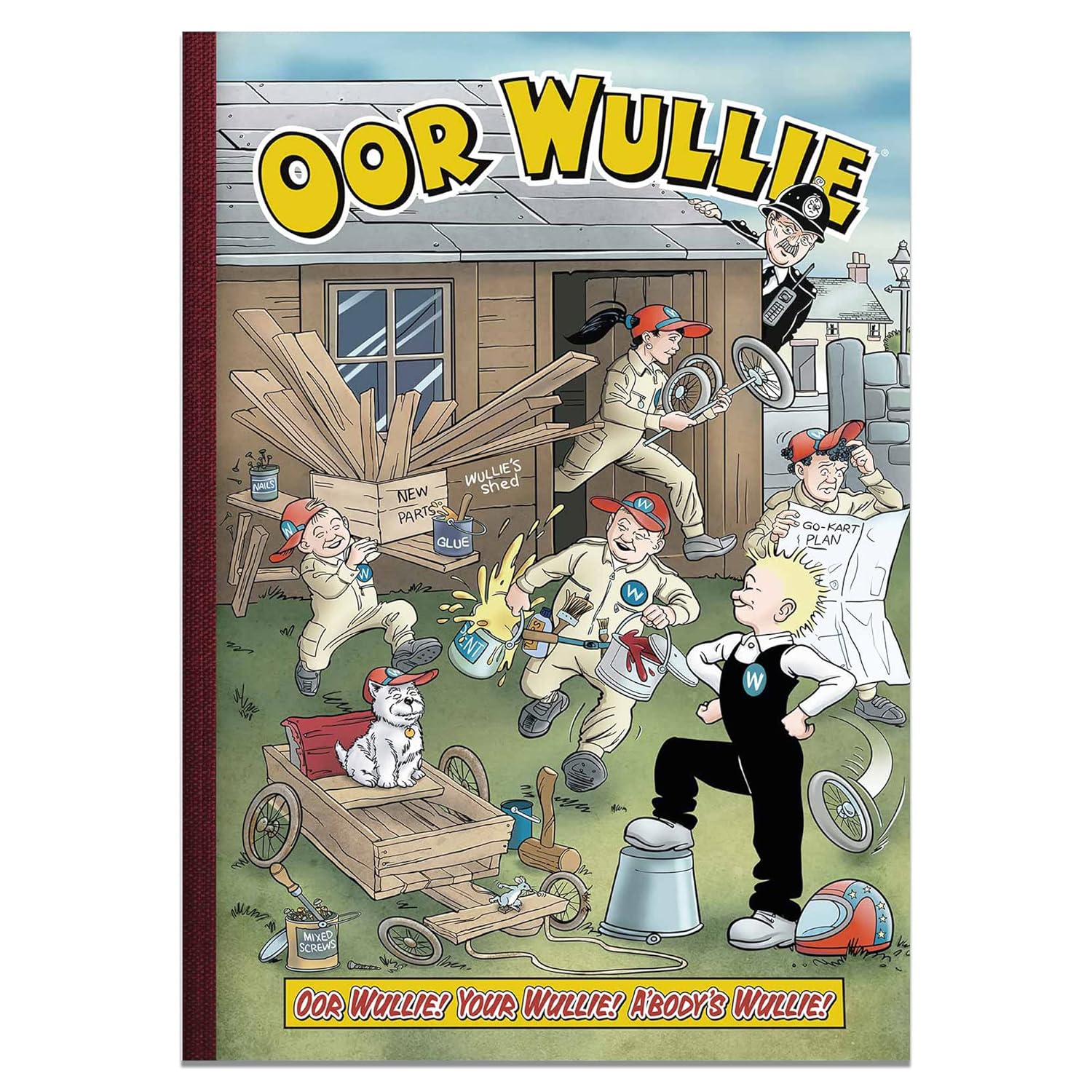About this deal
jing, n.’, Scottish National Dictionary , Dictionary of the Scots Language, https://dsl.ac.uk/entry/snd/jing_n1 (Consulted 19 October 2020). hey or high jingo’, Oxford English Dictionary https://www.oed.com/view/Entry/101343?redirectedFrom=by+jingo#eid40393170 (Consulted 19 October 2020).
Criffins, Criftens, Crifty’, Scottish National Dictionary, Dictionary of the Scots Language https://dsl.ac.uk/entry/snd/criffins (Consulted 19 October 2020). a b "Oor Wullie marks 80 years since first appearance in The Sunday Post". The Sunday Post. 8 March 2016 . Retrieved 27 October 2021.
Books Multibuys
Peebles, Cheryl (16 June 2020). " 'You can actually see the likeness': Force unearths story of Fife copper who was real-life inspiration for PC Murdoch, Oor Wullie's nemesis". Criffins, Criftens, Crifty’, Scottish National Dictionary, Dictionary of the Scots Language https://dsl.ac.uk/entry/snd/criffins (Consulted 19 October 2020).
But let us not forget: No matter how ‘modern’ Oor Wullie might have become over the last two decades, his charming, somewhat old-fashioned flair is still reflected in the language. In many scholarly articles (cf. the aforementioned Farrell, Bjørnson) as well as non-scientific publications, Oor Wullie is associated with three exclamations: jings, crivvens and Help ma Boab. What these interjections mean will become clear in the following. Jings, Crivvens and Help ma Boab Michael Stubbs, ‘Society, Education and Language: The last 2,000 (and the next 20?) years of language teaching’ (p. 3), in Change and Continuity in Applied Linguistics, edited by Hugh Trappes-Lomax (Clevedon: BAAL and Multilingual Matters, 2000), pp. 15–34. Gavin Brightwell's history of Dudley Watkins' work". Thatsbraw.co.uk. Archived from the original on 14 May 2009 . Retrieved 21 September 2009.Starting in 1940 the Oor Wullie strips also appeared in the form of a Christmas annual which alternated every second year with “ The Broons”, another D. C. Thomson product. (No annuals were published between 1943 and 1946.) Pre-1966 annuals were undated. All in all, the expressions jings, crivvens and Help ma Boab are true landmarks in Oor Wullie, linguistically and culturally. In a corpus of 224 comic strips, jings is the most often used of the three. Jings shows a clear increase in use in the 1980s. It was then that the editors of the comics apparently felt obliged to increase somewhat the Scottishness in these stories. Not only was the language made to sound more Scottish (by using older expressions less common today); certain components were also added that were seen as typically Scottish. Now Wullie had a West Highland Terrier; he went hiking in the Highlands, and often attended traditional Scottish celebrations. This publishing policy, however, was changed in the late 1990s, as the Oor Wullie editors seem to have felt that this strategy was focusing too much on traditional Scottish symbols. In an attempt to attract more younger readers, the Scottish English was now slightly diluted. Oor Wullie in the digital age The first Oor Wullie comic strip was published in the Sunday Post on March 8, 1936. Since then, these comics have been printed every weekend as part of the Sunday Post’s Fun Section and again at the end of the year in annuals. From 1940 to 2015, these were published every other year, alternating with The Broons, a comic strip about a Scottish family, and in Special Collections that come out every few years. Fortunately, as its consistently large readership would put it, since 2015 the annuals have been published every year. Everybody knows Oor Wullie – Oor Wullie! Your Wullie! A’body’s Wullie! This is the well-known tagline on the cover of every annual collection of the Oor Wullie comic strips. Wullie, the fair-haired eight- or nine-year-old boy who lives in the fictitious Scottish town of Auchenshoogle, is the hero of many hilarious situations, getting into trouble with the authorities as he goes to school or church. With its nostalgic “Scotticized” language – and outfits – one simply must like Wullie. And this is the way it has been now for a remarkably long time.
For the early Oor Wullie comics, the use of the word ony was very typical. In fact, the first story (from March 8, 1936) both began and ended with We never get ony fun here; as for the next two stories (March 15 and March 22, 1936), we find this famous catch phrase only at the end (although without “here” as the last word). Ony also occurs in other Oor Wullie stories. Indeed, in a corpus of nearly 230 Oor Wullie stories, dated between 1936 and 2004, the expression ony occurs fifty-seven times, with forty-two times alone in the first thirty-four years of the comic strip’s publication. John Corbett, Language and Scottish Literature (Edinburgh: Edinburgh University Press, 1997), p. 188. Axel Koehler, ‘Patricians, Politics and Porridge Olympics – the Scottish Highland Games and the Swiss Unspunnen Festival and the Idea of the Noble Savage’ (p. 33), in International Journal of Ethnosport and Traditional Games, (1)(2019), 32–59.
Diaries & Calendars
Ingvild Haavet Bjørnson, Michty me, whit are ye gassin’ aboot? The use of Scots in the newspaper comic strips The Broons and Oor Wullie. Master Thesis. English Department, University of Bergen, 2009.
 Great Deal
Great Deal 